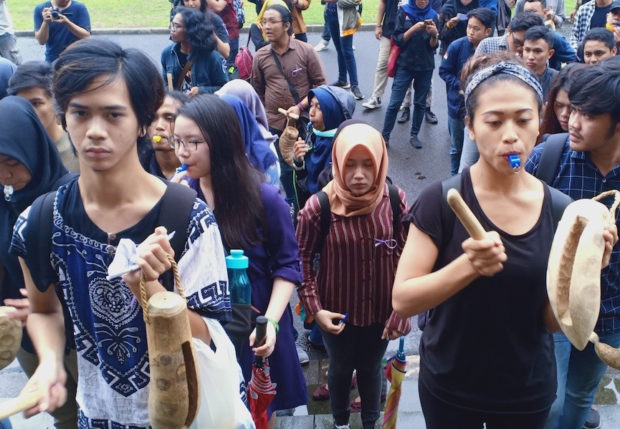Police grill alleged rape victim for 12 hours

Credit to Author: hniitsu| Date: Thu, 03 Jan 2019 03:02:42 +0000
YOGYAKARTA — Yogyakarta Police have opened an investigation into a sexual assault case after an official at Gadjah Mada University (UGM), the school of both alleged victim and perpetrator, reported the case to the police against the victim’s wishes.
Catur Udi Handayani, the lawyer of the victim, who goes by the pseudonym Agni, said the victim had been summoned by the police and had undergone 12 hours of questioning.
Catur said Agni underwent the questioning at Rifka Annisa Women Crisis Center, not at the police station, to take into account Agni’s psychological comfort.
“At the time [of grilling], Agni was under pressure and very tired because she was questioned for 12 hours,” she said on Monday.
Agni said she had been assaulted by another student, identified as HS, during a community service assignment in June 2017 in Maluku. Her case became public after UGM’s student press, Balairung, made a report about her case and the subsequent victim blaming by various UGM officials.
Catur said the assault happened in a house in Maluku and that Agni did not scream because she was afraid other people in the house would blame her. “But she turned her back on HS and then he pulled her so that she was facing him again,” Catur said.
The lawyer said this fact would be enough to prove that HS had attempted rape as stipulated in Article 285 of the Criminal Code(KUHP) and indecent conduct in Article 289 of the KUHP.
In theBalairungreport, Agni said she had turned her back on him and pretended to be sleeping, hoping HS would stop touching her. Agni said she finally yelled at HS after she felt pain as the result of HS’ action. HS stopped his alleged assault after she yelled.
HS’ lawyer, Tommy Susanto, said his client had also been summoned by the police in mid- December.
Tommy denied his client had forced Agni to do anything against her will, although he reportedly acknowledged physical contact. “They kissed and did other stuff, but there was no element of force or threat,” he said. The lawyer said the physical contact took place while both people were “aware”. “They slept in the same room and the woman went to his place, the place is not her place,” he said.
The lawyer asked UGM to let his client graduate in February because he said the alleged crime did not have anything to do with academic matters.
Earlier, Agni told people close to her that she did not want to pursue any legal avenues because she was afraid the law would not protect her.
The head of security, safety and health for UGM workers and the community, Arif Nurcahyo, reported the case to police on Dec. 9.
Husna Yuni Wulansari, a #KitaAgni volunteer, said in December that Agni was surprised to learn that the university had reported the case to the police without consulting her first.
Husna added that Agni was of the opinion that legal proceedings would be counterproductive to what she sought — justice and maximum protection.
The legal system, from the police, prosecutors to judges, is notorious for victim blaming. Ratna Batara Munti from the Legal Aid Foundation of the Indonesian Women’s Association for Justice (LBH APIK) said in a recent discussion that its clients often received unsympathetic questions from investigators, including with regard to whether the perpetrator moved their body left and right or up and down during the assault?
In 2014, a victim of sexual assault at the hands of Transjakarta staff, was questioned about her attire by judges. The judges asked why the victim, an Acehnese and a Muslim, wore short pants. The judges also asked about the color of her undergarments on the day of the assault. The court sentenced the perpetrator 18 months’ imprisonment, but the legal process made the victim bear what law experts called “double victimization” under the hands of legal authorities.
UGM criminal law expert Sri Wiyanti Eddyono said last month that the structure and content of laws in Indonesia, especially when it came to gender violence, remained biased in favor of perpetrators.
“Our criminal law still sees rape and sexual assault within the context of immorality, not as a crime against the body and soul. This is a problem,” said Wiyanti, who also chairs an ethics team set up to examine Agni’s case. (evi)